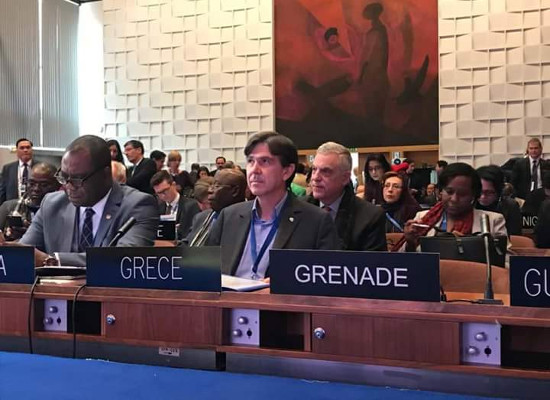
02-11-17 Ο Υφυπουργός Παιδείας Δημήτρης Μπαξεβανάκης στη ετήσια Γενική Διάσκεψη της UNESCO
Την 1η Νοεμβρίου 2017 πραγματοποιήθηκε στο Παρίσι ειδική υπουργική συζήτηση στο πλαίσιο της 39ης Γενικής Διάσκεψης της UNESCO με θέμα «Ενισχύοντας τη λογοδοσία κατά την προώθηση του στόχου Βιώσιμης Ανάπτυξης 4 για την Εκπαίδευση 2030».
Την Ελλάδα εκπροσώπησε ο Υφυπουργός Παιδείας, Έρευνας και Θρησκευμάτων Δ. Μπαξεβανάκης, με παρέμβαση στο θεματικό κύκλο ‘Λογοδοσία: Διαφορετικές προσεγγίσεις’. Στην δίλεπτη τοποθέτησή του ο κ. Μπαξεβανάκης επισήμανε ότι η Ελλάδα διασφαλίζει ενταξιακή, δημόσια εκπαίδευση που παρέχεται ισότιμα σε όλους/-ες τους/τις μαθητές/-τριες σε όλες τις βαθμίδες εκπαίδευσης, όντας δημόσιο αγαθό.
Ο κ. Μπαξεβανάκης ανέφερε ότι το ελληνικό εκπαιδευτικό σύστημα είναι συνεκτικό, παρέχεται κεντρικά από το κράτος αλλά η οργάνωση και διοίκηση των σχολείων τελείται τόσο σε εθνικό όσο και σε τοπικό- περιφερειακό επίπεδο. Στην παρέμβασή του ο κ. Μπαξεβανάκης τόνισε ότι τα εκπαιδευτικά πρότυπα δεν πρέπει να βασίζονται αποκλειστικά σε αξιολογικές μεθόδους και κάλεσε τους διεθνείς οργανισμούς να λαμβάνουν υπόψη τους και κοινωνικό- οικονομικούς παράγοντες όταν θέτουν κοινά σημεία αναφοράς για την εκπαίδευση.
Αναφορικά με την επίτευξη του στόχου 4 ο Υφυπουργός επισήμανε ότι το Υπουργείο Παιδείας σχεδιάζει την επέκταση της τυπικής υποχρεωτικής εκπαίδευσης ώστε να περιλαμβάνει την Προσχολική Αγωγή και τη φοίτηση στο Λύκειο.
Σημαντικός άξονας της τοποθέτησης του Υφυπουργού υπήρξε η αναφορά του στην αναβάθμιση της Επαγγελματικής Εκπαίδευσης και Κατάρτισης (ΕΕΚ). Αναφέρθηκε στην αναμόρφωση της δομής του Επαγγελματικού Λυκείου, στη διεύρυνση της πρόσβασης και σε Πανεπιστήμια και στην εφαρμογή του Μεταλυκειακού Έτους- Τάξη Μαθητείας ώστε να εξασφαλιστεί η ασφαλής είσοδος των αποφοίτων στο χώρο εργασίας. Καταλήγοντας ο Υφυπουργός έδωσε έμφαση στο γεγονός ότι η ποιοτική εκπαίδευση για όλους πρέπει να είναι ένας παγκόσμιος στόχος και να μην αφορά μόνο στις ατομικές ενέργειες της κάθε χώρας αλλά στην υιοθέτηση μιας αποτελεσματικής κοινής στρατηγικής στο πλαίσιο της συν-ευθύνης και της εμπιστοσύνης μεταξύ όλων των χωρών.
ΟΜΙΛΙΑ ΥΦΥΠΟΥΡΓΟΥ
Mr President of the General Conference, Mr Chair of the Executive Board, Madame Director-General, Excellency Ministers, Distinguished Delegates, Ladies and Gentlemen,
On behalf of the Greek Ministry of Education, Research and Religious Affairs, it is my honor to address this highly regarded gathering of the 39th UNESCO General Conference. Greece acknowledges UNESCO’s role into implementing the new Education agenda 2030. Let me state that Greece gradually aligns itself with the Goal 4, which is of primary importance on a national and international level and calls for joint action and collaboration.
Originally the constitution of Greece ensures inclusive, free of cost education provided equally for all students at all levels of primary, secondary and tertiary education. Greece strongly believes that education is a human right, a public good that can help eliminate socioeconomic barriers. It guarantees the compliance with global sustainable development goals with respect to each country’s differentiated needs and standards. And for that reason accountability cannot be an end in itself for education but should rather be a means for each country to improve its educational processes, methods and resources.
Education in Greece is based on a cohesive, state- led system which assigns responsibility of organization and administration of schools on a national and further regional level in an attempt to cultivate shared leadership responsibility. Greek Ministry of Education has also announced reforms that actively engage school communities in the process of high quality education and better learning outcomes. Yet, I would like to stress here that educational standards should not be performance- based only and for that we invite international organizations to take into account socio economic factors when setting common benchmarks. We additionally suggest that all education actors work together. In fact, in Greece we frequently invite all stakeholders to participate in an open public consultation practice in the Hellenic Parliament before implementing any reform. However, no reform or decision will ever be enough unless all Ministries of Education demand for more public funds distributed to education.
With regard to better accomplishing Sustainable Development Goal 4 we have announced the expansion of compulsory education so as to provide all students with early childhood care and education as well as upper high school completion. Concerning goal 4 targets, I would like to share with you the experience of Greece in upgrading vocational education and training. So, over the past two years we have developed a detailed Strategic Plan for VET and Apprenticeship aiming at raising and ensuring effectiveness and attractiveness of vocational education and training and enhance its connection to the needs of the labour market and those of the society. We restructured secondary VET specialties so as to widen the educational opportunities of students avoiding untimely specialization. We expanded access to higher education to offer better academic opportunities. We implemented a post- secondary vocational apprenticeship program, based on work based learning methodology so as to ensure graduates’ safe first contact with the workplace and further provide them with salary and labour rights. By effectively completing our national strategic framework for vocational education and training we managed to get access to EU funds that will be allocated for our purpose.
To conclude, I strongly believe that quality education for all should be a cross governmental target that keeps all countries accountable not just for their individual actions but for establishing effective strategy on the ground of shared responsibility and trust.
